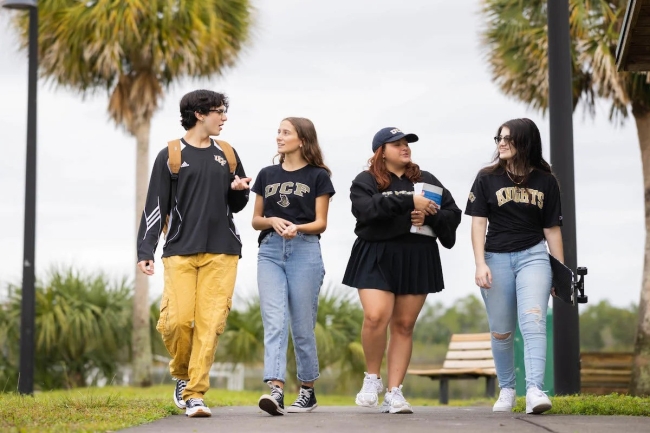You have /5 articles left.
Sign up for a free account or log in.

Students at the University of Central Florida will benefit from a centralized advising model starting this fall.
Kadeem Stewart/University of Central Florida
Just over half (55 percent) of college students receive advising on courses and course sequences and less than that (52 percent) have been advised on degree progress, according to a 2023 Student Voice survey by Inside Higher Ed and College Pulse.
Advising plays a key role in helping students persist and graduate—and a lack of quality advising can increase time to degree, wasted credits and frustrated learners.
In 2023, the University of Central Florida modified its advising and coaching model into a singular role, centralizing staff under one umbrella and modifying job descriptions for staff. Starting this fall, all students will be assigned an academic success coach who will provide assistance with course registration and degree mapping and also assist with personal challenges students face in their academics.
The new initiative is designed to improve retention and graduation rates across the college as well as raise morale and energy among the advising team.
What’s the need: In the past, academic advisers were decentralized under each college at UCF, allowing every advising unit to practice its own approach and unequally distributing caseloads depending on the number of students enrolled.
“Students’ experiences across the colleges as [they] related to advising, [they were] just all over the place,” explains DeLaine Priest, associate vice president for student success initiatives at UCF. “We were looking for an opportunity where we could have a standard student experience across the campus.”
Students could wait up to two hours for walk-in appointments at advising offices and four-year graduation rates have hovered at 54 percent for first-time, full-time students and at 50 percent for three-year graduation rates for transfers.
An internal review also showed adviser caseloads could be extremely high in some colleges (anywhere from 1:200 to 1:2,000) and staff compensation was below market value, resulting in high turnover in an office that is critical to the student lifecycle.
Beyond needing to improve the workload and pay, UCF leaders identified an opportunity to improve relationships between advisers and students, moving from a transactional interaction to a more interpersonal one.
UCF has offered success coaching since 2016 for its online learners and later for its transfer students, but the service was separate from advising and housed in its own office. With the restructuring, advising and coaching staff assume the same role and are merged into one office, reporting to the Division of Student Success and Well-Being.
How it works: As of this semester, there are no longer advisers or success coaches, only academic success coaches who work with students.
“We are impacting students from start to finish,” says Jennifer Sumner, assistant vice provost of academic and student digital initiatives. “That coach will be with that student all the way through graduation, working differently with them, building relationships with them and helping to keep them on that path, on that journey, all the way through their entire UCF experience.”
As coaches, staff will be responsible for proactive outreach to students with the hope that students will see their adviser not as a gatekeeper to courses but as someone who helps them with whatever they need to be successful, Sumner says.
Each coach will have a maximum caseload of around 490 students, which is still high but nowhere near the levels advisers were handling prior, Sumner says.
“One of the beauties of the model [is] we’re now able to be nimble with how we move those staff; it’s not like we’ve got to hire for a particular college … I’m able to now move a coach from this college that may have a very low ratio to this college that had a very high ratio,” Sumner says.
UCF plans to hire 14 new staff members to help meet this need, in addition to the restructured staff.
Investing in talent: Academic advisers and success coaches receive cross-functional training, learning the role and responsibilities of the other position to equip them for the new role. All staff complete UCF’s Higher Education Coaching Academy and learn to use a centralized customer relationship management system to collect unified student data, as well.
With the role changes come salary adjustments for all existing staff and a new minimum salary for new hires, funded by a $3.5 million investment from the provost’s office, says Paul Dosal, senior vice president for student success.
“We did this to improve the quality of our services to students, not to save money,” Dosal says. “We’ve invested more in this effort because we want to become more efficient.”
Advisers and coaches assume new titles based on their level of seniority. For example, Advisor III and Success Coach III titles are now Senior Academic Success Coaches.
What’s next: The process change started in October 2023 and finished in March 2024 when staff completed training on policies, procedures and other information, just in time for orientation this summer.
The university will build a website and start issuing communication to incoming and continuing students in the near future, letting them know about the change and getting them familiar with new processes. Online and transfer students are already familiar with working with coaches, so Sumner anticipates a smooth transition.
The university will be tracking timely graduation for first-time students and transfers, as well as other data to gauge effectiveness, including phone wait times and the number of walk-ins to measure demand and if students are having proactive services (they shouldn’t have to walk-in if staff are reaching out, Priest explains).
Administrators also hope to increase the number of students who are indicating intent to graduate each term and decrease the number of students changing their majors, because sticking with a major helps lead to timely graduation.
Get more content like this directly to your inbox every weekday morning. Subscribe here.







.jpeg?itok=aGrC82hx)
